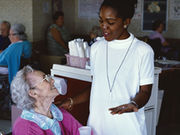Most serious adverse events caused by medication errors, falls, delayed or inappropriate intervention
WEDNESDAY, June 21, 2017 (HealthDay News) — Most serious adverse events in nursing homes are caused by medication errors, falls, delayed or inappropriate interventions, and missed nursing care, according to a study published online June 15 in the Journal of Clinical Nursing.
Åsa Andersson, R.N., from the Karolinska Institutet in Stockholm, and colleagues conducted a retrospective study involving 173 adverse events in nursing homes. They analyzed the reports of adverse events with content analysis and described the frequencies of the adverse events and their contributing factors.
The researchers found that the majority of serious adverse events (89 percent) were caused by medication errors, falls, delayed or inappropriate intervention, and missed nursing care. They identified a total of 693 putative contributing factors; the most common were lack of competence, incomplete or lack of documentation, teamwork failure, and insufficient communication.
“The contributing factors frequently interacted yet they varied between different groups of serious adverse events,” the authors write. “The resident’s safety depends on the availability of staff’s competence as well as adequate documentation about the resident’s condition. Lack of competence was underestimated by health care providers.”
Copyright © 2017 HealthDay. All rights reserved.








